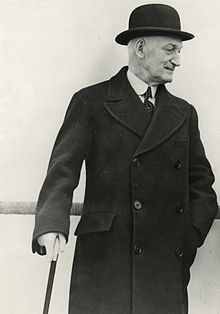Edward William Archibald
Edward William Archibald | |
|---|---|
 | |
| Born | August 5, 1872 Montreal, Quebec, Canada |
| Died | December 17, 1945 (aged 73) Montreal, Quebec, Canada |
| Nationality | Canadian |
| Occupation | Surgeon |
Edward William Archibald (August 5, 1872 – December 17, 1945) was a
In 1908, Archibald published a
Early life
Edward William Archibald was born on August 5, 1872, in
Early career
In 1901, Archibald was appointed as a staff member at the Royal Victoria Hospital Department of Surgical Pathology. However, soon after he entered this position, the surgeon began to develop a cough, lose weight and experience fatigue. These symptoms were confirmed to be as a result of tuberculosis by the hospital's Chief of Medicine, and Archibald moved to the Adirondack Cottage Sanitarium in upstate New York to experience a change of climate. The surgeon returned to Canada upon his recovery, and in 1904 was appointed to the Royal Victoria Hospital's department of surgery. The same year, Archibald married Agnes Maud Black Barron. The head of that department, a Dr. Ruddick, encouraged Archibald to develop the new practices he had learned during his time in Europe, and his work in this field has led to many dubbing him Canada's first neurosurgeon.[2] In 1908, Archibald published Surgical Affection and Wounds of the Head, a monograph that was at the time considered to be the most comprehensive text on the subject.[2][3]
Research, education and later years
Archibald's work in investigating the disease of
Archibald died on December 17, 1945, in Montreal. By the end of his life, the surgeon had been bestowed the Trudeau Medal of the National Tuberculosis Association and the Boston Surgical Society's Bigelow Medal. He was an Honorary Fellow of the
References
- ^ "Edward William Archibald". Portraits in time. McGill University Health Centre Foundation. January 12, 2006. Archived from the original on June 15, 2011. Retrieved November 2, 2010.
- ^ a b c d Mulder, David (Spring 2008). "Plaque to Commemorate Dr. Edward William Archibald" (PDF). The Square Knot. McGill University Department of Surgery: 1 and 12. Archived from the original (PDF) on 2016-03-04. Retrieved 2010-11-02.
- ^ PMC 1582573.
- ^ PMC 2242059.
- Lister Oration sponsored by the Royal College of Surgeons of England.)
- doi:10.3138/cbmh.23.1.269. Archived from the originalon 2011-07-06. Retrieved 2010-11-02.
- ^ "'Edward Archibald Surgery' search". Google Scholar. Retrieved November 2, 2010.
- ^ Bensley, Edward (n.d.). "Archibald, Edward William". The Canadian Encyclopedia. Archived from the original on August 25, 2007. Retrieved November 2, 2010.
- ^ "Edward William Archibald Fonds, P88". McGill Archival Collections Catalogue.
- ^ "Edward William Archibald Fonds, MG3010". McGill Archival Collections Catalogue.
Further reading
- Entin, Martin (2005). Edward Archibald: Surgeon of the Royal Vic. ISBN 0-7735-2951-9.
- Edward William Archibald Fonds, P88. Osler Library of the History of Medicine. McGill University Library.
- Edward William Archibald Fonds, MG3010. McGill University Archives.
